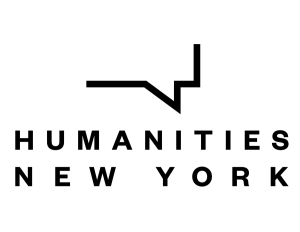
7:30 PM EST
Event Description:
Sponsored by Humanities NY – Six Wednesday evenings, 6:00-7:30PM – April 12, 19, 26 & May 3, 10, 17 (2023) – ZOOM only
Theme – “Land, Liberty & Loss: Echoes of the American Revolution”
Book – Our Beloved Kin: A New History of King Philip’s War by Lisa Brooks
- One time registration fee: $10 Registration Fee
- Watch for the ZOOM link from events@waltwhitman.org. The link will be sent the first week of the book discussion. The same link will be used for all 6 sessions.
- You can purchase a copy of Our Beloved Kin: A New History of King Philip’s War online, or borrow a copy from your local library.
Sarah Kautz is an archaeologist, historical anthropologist, and preservation planner with nearly 20 years of professional experience. She has worked collaboratively with stakeholders and governments in the United States, Japan, and South Africa to study and preserve heritage sites. Her work seeks to make understandings of the past relevant and useful in our everyday lives. Click here for Sarah Kautz bio.
Facilitator Sarah Kautz presents Our Beloved Kin: A New History of King Philip’s War, a book selection by Humanities NY for their Series “Land, Liberty & Loss: Echoes of the American Revolution.” Our Beloved Kin: A New History of King Philip’s War offers a thought-provoking account of conflict, captivity, resistance, and survival from an Indigenous perspective. Focusing on the experiences of Weetamoo (a female Wampanoag leader) and James Printer (a Nipmuc scholar), this book gives readers fresh insight into commonly heard stories about the period, such as Mary Rowlandson’s captivity narrative, in which both Weetamoo and James Printer appear. In this discussion group, we will consider how legacies of settler colonialism frame American history. We will also explore how Our Beloved Kin opens up new possibilities for re-telling American history.
The Digital Companion website for Our Beloved Kin includes visualizations and additional content developed by the author, including links to Maps (the full color maps created for each chapter), Documents (images of original manuscripts and other documents associated with each chapter) and/or Connections (maps and documents in historical and geographical context, contemporary images of places and other related media).
April 12
Introductions, review the reading list, and discuss the major themes of our readings.
Reading:
- Land, Liberty & Loss: Echoes of the American Revolution essay by Alan Taylor: https://humanitiesny.org/land-liberty-loss-echoes-of-the-american-revolution
- Our Beloved Kin “Introduction: The Absence of Presence”
- Our Beloved Kin “Prologue: Caskoak, the Place of Peace”
Recommended (videos):
- We Still Live Here–Âs Nutayuneân, documentary about the revitalization of the Wampanoag language https://www.dailymotion.com/video/x3h1myn. As you read Our Beloved Kin, you’ll encounter many Wampanoag words. Does language matter in the stories we tell? Why?
- Partnership of Historic Bostons lecture: Whose Name, Whose Place? Native Placenames In Southern New England (September 2022) https://historicbostons.org/events/1
April 19
Our Beloved Kin–Part 1, The Education of Weetahmoo and James Printer: Exchange, Diplomacy, Dispossession
Reading:
- Chapter 1: Namumpum, “Our Beloved Kinswoman,” Saunkskwa of Pocasset: Bonds, Acts, Deeds
- Chapter 2: The Harvard Indian College Scholars and the Algonquian Origins of American Literature
- Interlude: Nashaway, Nipmuc Country, 1643–1674
April 26
Our Beloved Kin–Part 2, No Single Story: Multiple Views on the Emergence of War
Reading:
- Chapter 3: The Queen’s Right and the Quaker’s Relation
- Chapter 4: Here Comes the Storm
- Chapter 5: The Printer’s Revolt: A Narrative of the Captivity of James the Printer
May 3
Our Beloved Kin–Part 3, Colonial Containment and Networks of Kinship Expanding the Map of Captivity, Resistance, and Alliance
Reading:
- Chapter 6: The Roads Leading North: September 1675–January 1676
- Interlude: “My Children Are Here and I Will Stay” Menimesit, January 1676
- Chapter 7: The Captive’s Lament: Reinterpreting Rowlandson’s Narrative
Recommended (video):
- Partnership of Historic Bostons lecture: Cruel Or Courageous? A New Reading Of Mary Rowlandson’s Captivity Narrative (July 2022) https://historicbostons.org/events/1-puritan-social-gospel-and-the-city-on-a-hill-m84ff-hb2e6-gtmdp
May 10
Our Beloved Kin–Part 4, The Place of Peace and the Ends of War
Reading:
- Chapter 8: Unbinding the Ends of War
- Chapter 9: The Northern Front, Beyond Replacement Narratives
May 17
At our last meeting, we will have an open discussion of Our Beloved Kin. We will also discuss how Our Beloved Kin inspires retelling Long Island’s colonial history from an Indigenous perspective.
Reading:
- “The Thirteen Tribes of Long Island: The History of a Myth,” by John Strong, The Hudson Valley Regional Review, 1992 https://drive.google.com/file/d/158I684cdyoR8B4zRDyWA3vUDedrshpBh/view?usp=share_link
- Take a close look at the content in “Native American Long Island,” part of the Brooklyn Historical Society’s virtual exhibit, Revealing Long Island History: https://longisland.brooklynhistory.org/themes/native-american-long-island
- “The Meanings of a Native American House in a Black Neighborhood,” by Allison Manfra McGovern and Anjana Mebane-Cruz, Journal of African Diaspora Archaeology and Heritage, 2019 https://drive.google.com/file/d/1rrkq4fu81jquZsepe1Tq5vwJIcwfHxUA/view?usp=share_link
Recommended:
- Montaukett NYS Tribal recognition: http://www.montaukwarrior.info/?page_id=274
- Conscience Point documentary https://www.pbs.org/independentlens/documentaries/conscience-point
- Niamuck Land Trust https://niamucklandtrust.org/home-1
- NYS Unmarked Burial Protection Act https://preservationlongisland.org/action-alert-burial-site-protection
This Series is Sponsored by a Humanities New York Reading and Discussion Grant.
This program is made possible with funds from NY State Parks, Suffolk County, Town of Huntington, and NYS Council on the Arts through Huntington Arts Council.

